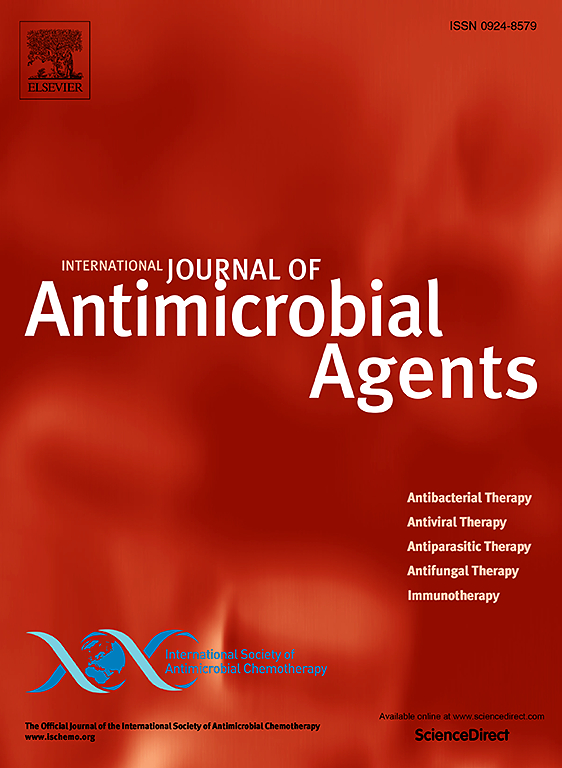反复难辨梭状芽胞杆菌感染的冻干粪便菌群转移胶囊。
IF 4.6
2区 医学
Q1 INFECTIOUS DISEASES
International Journal of Antimicrobial Agents
Pub Date : 2025-07-01
DOI:10.1016/j.ijantimicag.2025.107561
引用次数: 0
摘要
背景:最近的指南推荐对经历多次艰难梭菌感染(CDI)的患者进行粪便微生物群移植(FMT)。近年来,冻干和包封的FMT的可用性大大提高了患者的舒适度和便利性。虽然口服胶囊中FMT的有效性似乎与通过其他途径取得的效果相当,但需要进一步的经验,特别是在欧洲,目前发表的经验有限。本研究的目的是介绍我们对这种治疗方式的经验。方法:回顾性队列研究的复发性CDI患者冻干,包封FMT治疗。所有患者至少随访12周。主要预后指标为3个月复发。结果:36例患者共接受38次fmt治疗。该队列的中位年龄为78.5岁,中位既往发作次数为4次。在3个月的随访中,36例患者中有27例(75.0%)无CDI。1例患者在6个月前出现复发。10例FMT失败的患者中有2例通过第二次FMT成功获救。在接受抢救尝试的9例患者中,7例没有复发,36例患者的治愈率为91.7%。我们没有发现与FMT相关的严重不良反应。结论:我们证实冻干胶囊口服FMT具有可接受的有效性。有趣的是,大多数FMT失败的患者可以通过一种新的治疗方法治愈,而这种治疗方法不一定是新的FMT。本文章由计算机程序翻译,如有差异,请以英文原文为准。
Lyophilised fecal microbiota transfer in capsules for recurrent Clostridioides difficile infection
Background
Recent guidelines recommend fecal microbiota transplantation (FMT) for patients who experience multiple episodes of Clostridioides difficile infection (CDI). The availability of lyophilised and encapsulated FMT in recent years has greatly improved patient comfort and convenience. While the effectiveness of FMT in oral capsules seems comparable to that achieved through other routes, further experience is needed, particularly in Europe, where there is currently limited published experience. The objective of this study was to present our experience with this therapeutic modality.
Methods
A retrospective cohort study on patients with recurrent CDI treated by lyophilised, encapsulated FMT. All patients were followed for a minimum of 12 weeks. The primary outcome was recurrence at three months.
Results
A total of 36 patients received 38 FMTs. The median age of the cohort was 78.5 years, with a median of four previous episodes. At the three-month follow-up, 27 of the 36 patients (75.0%) were free of CDI. One patient exhibited recurrence before the six-month mark. Two of the ten patients with FMT failure were successfully rescued with a second FMT. Of the nine patients who underwent rescue attempts, seven did not experience recurrence, resulting in a cure rate of 91.7% for the 36 patients. We did not detect severe adverse effects related to the FMT.
Conclusion
We confirm an acceptable effectiveness of lyophilised capsulated oral FMT. Interestingly, most patients with FMT failure can be cured with a new treatment, which need not necessarily be a new FMT.
求助全文
通过发布文献求助,成功后即可免费获取论文全文。
去求助
来源期刊
CiteScore
21.60
自引率
0.90%
发文量
176
审稿时长
36 days
期刊介绍:
The International Journal of Antimicrobial Agents is a peer-reviewed publication offering comprehensive and current reference information on the physical, pharmacological, in vitro, and clinical properties of individual antimicrobial agents, covering antiviral, antiparasitic, antibacterial, and antifungal agents. The journal not only communicates new trends and developments through authoritative review articles but also addresses the critical issue of antimicrobial resistance, both in hospital and community settings. Published content includes solicited reviews by leading experts and high-quality original research papers in the specified fields.

 求助内容:
求助内容: 应助结果提醒方式:
应助结果提醒方式:


